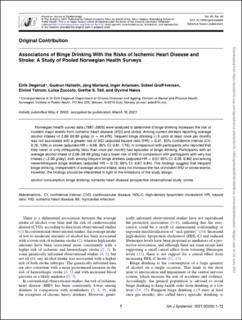Binge drinking and risk of ischemic heart disease and stroke. A study of pooled Norwegian health surveys
Degerud, Eirik Magnus Meek; Høiseth, Gudrun; Mørland, Jørg; Ariansen, Inger Kristine Holtermann; Graff-Iversen, Sidsel; Ystrøm, Eivind; Zuccolo, Luisa; Tell, Grethe S.; Næss, Øyvind
Peer reviewed, Journal article
Published version
Permanent lenke
https://hdl.handle.net/11250/3009534Utgivelsesdato
2021Metadata
Vis full innførselSamlinger
- Artikler [5061]
- Publikasjoner fra CRIStin FHI [7536]
Originalversjon
10.1093/aje/kwab063Sammendrag
Norwegian health survey data (1987 – 2003) were analysed to determine if binge drinking increases the risk of incident major events from ischemic heart disease (IHD) and stroke. Among current drinkers reporting average alcohol intakes between 2 to 60 g/day (n = 44,476), frequent binge drinking (5+ units ≥ once per month) was not associated with a greater risk of IHD (adjusted hazard ratio = 0.91, 95% confidence interval: 0.76, 1.09) nor stroke (adjusted hazard ratio = 0.98, 95% confidence interval: 0.81, 1.19), in comparison with participants who reported that they never or only infrequently (<once per month) had episodes of binge drinking. Participants with an average alcohol intake between 2 – 60 g/day had a lower risk of IHD in comparison with participants with very low intakes (<2 g/day) both among frequent binge drinkers (adjusted hazard ratio = 0.67, 95% confidence interval: 0.56, 0.80) and among never/infrequent binge drinkers (adjusted hazard ratio = 0.75, 95% confidence interval: 0.67, 0.84). The findings suggest that frequent binge drinking does not, independently of the average alcohol intake, increase the risk of incident IHD or stroke events. However, the findings should be interpreted in light of the limitations of the study design.
